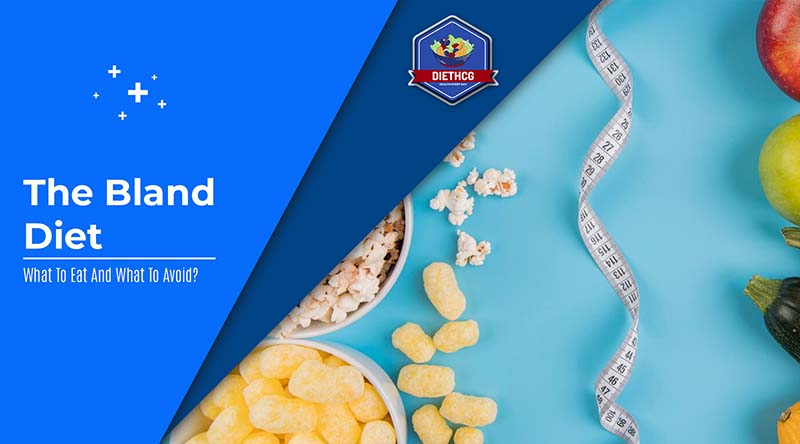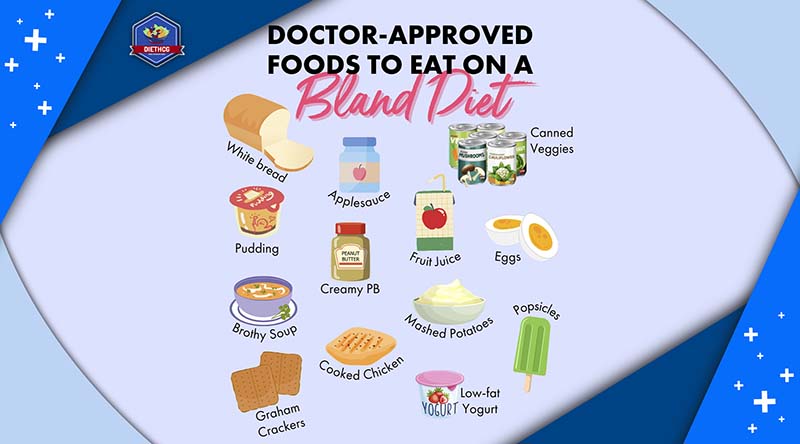A bland diet, often suggested for gut inflammation caused by conditions like infections, diverticulitis, and inflammatory bowel diseases, includes foods that are easy on the stomach and simple to digest. It’s also beneficial for managing acid reflux and peptic ulcers. Adapting to a bland diet involves selecting gentle foods, eating smaller, more frequent meals slowly, and avoiding lying down immediately after eating. We’ll explore the suitable foods, the diet’s mechanisms, and recent research findings on our DietHCG.

1. What Is Bland Diet
When certain health conditions arise or when there are changes in your well-being, adjustments to your diet may be necessary. In such cases, a bland diet could be recommended by healthcare professionals to alleviate digestive discomfort.
A bland diet is typically a short-term solution aimed at helping the body recover. It involves consuming foods that are bland and easily digestible, often referred to as “soft” or “low-residue” foods.
This dietary approach focuses on limiting acidity and fiber intake, making digestion easier. By opting for foods that are gentle on the stomach, a bland diet allows the gastrointestinal system to rest, reducing irritation and minimizing gas production.

2. Foods You Can Eat in a Bland Diet
Before making any changes to your diet, it’s crucial to consult with a healthcare professional to ensure it aligns with your individual dietary needs.
Foods suitable for a bland diet should be soft, low in fat and fiber, and easily digestible. Additionally, they should be free from heavy spices, strong flavors, or excessive seasoning.
While individual tolerances may vary, the general aim of a bland diet is to avoid foods that commonly trigger digestive issues such as bloating, diarrhea, gas, and nausea.
Recommended foods for a bland diet include:
- Tender meats like fish, pork, beef, and poultry
- Tofu
- Broth
- Smooth nut butters
- Eggs
- Well-cooked skinless and seedless vegetables such as potatoes, squash, and carrots
- Plant-based milk alternatives such as almond milk, walnut milk, flax milk, and coconut milk
- Fruit juices (though individuals with acid reflux may need to avoid tomato and citrus juices)
- Puddings and custard
- Refined grains such as rice, white bread, Cream of Wheat, and pasta
- Dairy, if tolerated by the individual
- Weak black tea, green tea, and certain herbal teas

Note: It’s important to listen to your body and adjust your diet accordingly, as tolerance to specific foods can vary among individuals. Additionally, those with specific health conditions may need to further customize their bland diet under the guidance of a healthcare provider.
3. Foods to Avoid in a Bland Diet
In a bland diet, it’s important to steer clear of foods that are tough, high in fiber, high in fat, spicy, or known to cause gas. Such foods to avoid include:
- Tough, fatty meats and meats with casings like sausages
- Fried foods
- Legumes
- Spicy, seasoned, cured, or smoked meats, including fish
- Vegetables that can lead to flatulence, such as cabbage, Brussels sprouts, broccoli, cucumber, and corn
- Strong cheeses like blue cheese
- Fatty dairy products like whipping cream
- Pickles
- Sauerkraut
- High-sugar foods
- Nuts and seeds
- Whole grain cereals, breads, crackers, and pasta
- Crunchy nut butter
- Dried fruit
- Raw vegetables
- Gas-producing vegetables such as broccoli, Brussels sprouts, cabbage, onions, peppers, and cauliflower
- High-fiber cereals
- Fried pastries like donuts
- Gluten, if not tolerated by the individual
Additionally, certain foods and drinks, although not high in fiber, can still cause gastrointestinal irritation in some conditions, such as acid reflux. These include:
- Alcohol
- Certain spices and condiments like pepper, hot sauce, and barbecue sauce
- Strong seasonings such as garlic, horseradish, and chili pepper
- Caffeinated drinks like tea and coffee
- Citrus fruits
- Tomato products
Note: Individuals should be mindful of their specific dietary needs and any underlying health conditions when making food choices, and consulting with a healthcare provider can provide tailored guidance for optimal dietary adjustments.
4. Medications to Avoid While on a Bland Diet
When adhering to a bland diet, it’s advisable to avoid certain medications that can potentially irritate the stomach. Among these are aspirin and ibuprofen (brands like Advil and Motrin). These medications have been known to cause stomach upset and are generally best avoided when following a bland diet, particularly for managing conditions such as ulcers, heartburn, nausea, vomiting, diarrhea, and gas.
However, it’s crucial to consult with your healthcare provider for personalized guidance on medications to steer clear of while on a bland diet. They can offer tailored recommendations based on your specific health needs and medication regimen.
5. Who Should Follow a Bland Diet?
A bland diet is often recommended by doctors for individuals experiencing the following conditions:
- Stomach ulcers
- Heartburn
- Acid-peptic disorder
- Gastroesophageal reflux disease (GERD)
- Excessive flatulence or gas
- Stomach or intestinal inflammation (gastroenteritis)
- Food poisoning
- Excessive diarrhea
- Inflammatory bowel disease
- Colonic bulging (diverticulosis)
Moreover, a bland diet can be beneficial for individuals preparing for or recovering from medical procedures such as surgery and colonoscopies. Cancer patients undergoing chemotherapy may also find relief with a bland diet, as it can help manage symptoms like nausea or loss of appetite.
Because bland foods lack strong flavors and seasoning, they may be more appealing to individuals experiencing these symptoms. Despite the simplicity of the bland diet, it’s still possible to obtain all the necessary nutrients by adhering to its guidelines.
6. Tips for Following a Bland Diet
When following a bland diet, consider these helpful tips:
- Opt for smaller meals eaten more frequently throughout the day to ease digestion.
- Chew your food slowly and thoroughly to aid in digestion and minimize discomfort.
- If you smoke, consider quitting, as smoking can exacerbate digestive issues.

- Avoid eating within 2 hours of bedtime to reduce the risk of discomfort during sleep.
- Be vigilant about avoiding foods listed in the “foods to avoid” section, especially if they tend to make you feel unwell after consumption.
- When drinking fluids, do so slowly to prevent overwhelming your digestive system.
Following these tips can enhance the effectiveness of your bland diet and promote better digestive health.
7. Conclusion
In conclusion, a bland diet is useful for short-term digestive issues but lacks long-term nutritional completeness. Consult your doctor about the duration of the diet and reintroduction of foods. Your doctor might also suggest medications like antacids or lifestyle changes such as stress reduction to enhance digestive health. Following professional advice closely is crucial for effectively managing your condition and ensuring overall well-being.


